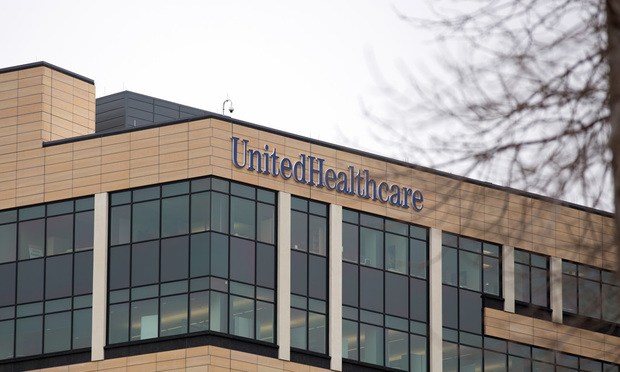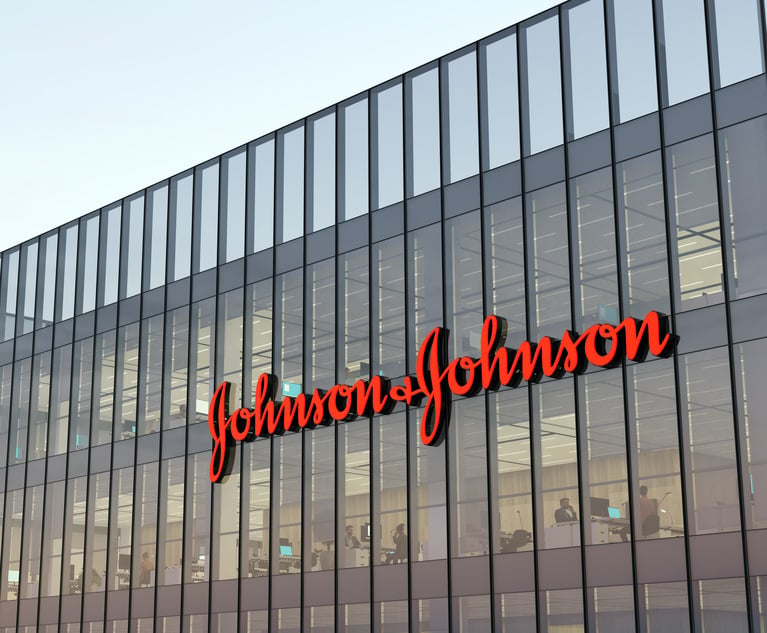Mental Health Care Providers Seek Payment From UnitedHealthcare for Billions in 'Wrongfully Denied Claims'
Although an earlier ruling from U.S. Magistrate Judge Joseph Spero aimed to address the harm caused to patients who were able to pay for their treatment out of pocket, it did nothing to rectify the harm done to unpaid healthcare providers, according to the complaint.
September 12, 2019 at 07:33 PM
3 minute read
 UnitedHealth Group Inc. headquarters stands in Minnetonka, Minnesota, U.S., on March 9, 2016. Photo: Mike Bradley/Bloomberg
UnitedHealth Group Inc. headquarters stands in Minnetonka, Minnesota, U.S., on March 9, 2016. Photo: Mike Bradley/Bloomberg
A new class action lawsuit is seeking to force UnitedHealthcare to reprocess claims that were denied from a mental health subsidiary of the nation's largest health insurer. The lawsuit comes after a federal judge ruled earlier this year that United Behavioral Health's coverage determinations were based on "cost-cutting" and "addressing acute symptoms," ignoring patients' broader addiction and mental illnesses.
U.S. Magistrate Judge Joseph Spero of U.S. District Court for the Northern District of California issued a 106-page ruling in March calling the processes United Behavioral Health used to assess coverage "harmful and illegal." In the earlier case, brought on behalf of patients and their families, Spero said the health insurance company's strategy valued the bottom line over the interests of its plan members, which lead to "a significantly narrower scope of coverage than is consistent with generally accepted standards of care."
The latest class action complaint, filed Wednesday also before Spero, seeks to compensate health care providers that treated UBH patients whose claims were denied using the guidelines, which the insurer changed Jan. 31 following litigation. The class is made up of licensed health care clinicians including Meridian Healthcare in Lauderdale-By-The-Sea, Florida, iRecover Treatment Inc. in Palm Desert, California, and Harmony Hollywood Treatment Center in Los Angeles. The mental health specialists assert that they offered medically necessary treatment to patients meeting generally accepted criteria but those claims were denied under UBH's former guidelines.
Although the ruling aimed to address the harm caused to patients who were able to pay for their treatment out of pocket, it did nothing to rectify the harm done to unpaid health care providers, according to the complaint. "The Plaintiffs and Plaintiff Class in this action seek redress in the form of reprocessing for what is likely billions of dollars in wrongfully denied claims," wrote Jennifer Liakos and Matthew Lavin of Napoli Shkolnik in Los Angeles, who were not involved in the patient suit. "All the while, UBH, UnitedHealth Group and its subsidiaries profited and pocketed premiums while those actually seeking help, often at some of the lowest, most desperate times of their life, were denied it by those tasked with ensuring their insureds received medically necessary care."
Unlike the class action that Spero previously ruled on, where patients fronted the costs of care themselves when UBH denied their claims, more often the company's guidelines strapped the healthcare providers with the financial burden of their services when clients were unable to pay, according to the complaint. Plaintiff Harmony Hollywood treatment center claims it racked up $2,516,303 from 92 UBH patients who were denied coverage.
The lawsuit bring claims of unfair business practices, breach of covenant of good faith and fair dealing, breach of implied contract and five other causes of action against UBH. The health care providers are seeking putative and injunctive damages.
UnitedHealthcare and Napoli's Liakos did not respond to a request for comment by the time of publication.
This content has been archived. It is available through our partners, LexisNexis® and Bloomberg Law.
To view this content, please continue to their sites.
Not a Lexis Subscriber?
Subscribe Now
Not a Bloomberg Law Subscriber?
Subscribe Now
NOT FOR REPRINT
© 2025 ALM Global, LLC, All Rights Reserved. Request academic re-use from www.copyright.com. All other uses, submit a request to [email protected]. For more information visit Asset & Logo Licensing.
You Might Like
View All
Hogan Lovells, Jenner & Block Challenge Trump EOs Impacting Gender-Affirming Care
3 minute read


Trending Stories
- 1States Accuse Trump of Thwarting Court's Funding Restoration Order
- 2Microsoft Becomes Latest Tech Company to Face Claims of Stealing Marketing Commissions From Influencers
- 3Coral Gables Attorney Busted for Stalking Lawyer
- 4Trump's DOJ Delays Releasing Jan. 6 FBI Agents List Under Consent Order
- 5Securities Report Says That 2024 Settlements Passed a Total of $5.2B
Who Got The Work
J. Brugh Lower of Gibbons has entered an appearance for industrial equipment supplier Devco Corporation in a pending trademark infringement lawsuit. The suit, accusing the defendant of selling knock-off Graco products, was filed Dec. 18 in New Jersey District Court by Rivkin Radler on behalf of Graco Inc. and Graco Minnesota. The case, assigned to U.S. District Judge Zahid N. Quraishi, is 3:24-cv-11294, Graco Inc. et al v. Devco Corporation.
Who Got The Work
Rebecca Maller-Stein and Kent A. Yalowitz of Arnold & Porter Kaye Scholer have entered their appearances for Hanaco Venture Capital and its executives, Lior Prosor and David Frankel, in a pending securities lawsuit. The action, filed on Dec. 24 in New York Southern District Court by Zell, Aron & Co. on behalf of Goldeneye Advisors, accuses the defendants of negligently and fraudulently managing the plaintiff's $1 million investment. The case, assigned to U.S. District Judge Vernon S. Broderick, is 1:24-cv-09918, Goldeneye Advisors, LLC v. Hanaco Venture Capital, Ltd. et al.
Who Got The Work
Attorneys from A&O Shearman has stepped in as defense counsel for Toronto-Dominion Bank and other defendants in a pending securities class action. The suit, filed Dec. 11 in New York Southern District Court by Bleichmar Fonti & Auld, accuses the defendants of concealing the bank's 'pervasive' deficiencies in regards to its compliance with the Bank Secrecy Act and the quality of its anti-money laundering controls. The case, assigned to U.S. District Judge Arun Subramanian, is 1:24-cv-09445, Gonzalez v. The Toronto-Dominion Bank et al.
Who Got The Work
Crown Castle International, a Pennsylvania company providing shared communications infrastructure, has turned to Luke D. Wolf of Gordon Rees Scully Mansukhani to fend off a pending breach-of-contract lawsuit. The court action, filed Nov. 25 in Michigan Eastern District Court by Hooper Hathaway PC on behalf of The Town Residences LLC, accuses Crown Castle of failing to transfer approximately $30,000 in utility payments from T-Mobile in breach of a roof-top lease and assignment agreement. The case, assigned to U.S. District Judge Susan K. Declercq, is 2:24-cv-13131, The Town Residences LLC v. T-Mobile US, Inc. et al.
Who Got The Work
Wilfred P. Coronato and Daniel M. Schwartz of McCarter & English have stepped in as defense counsel to Electrolux Home Products Inc. in a pending product liability lawsuit. The court action, filed Nov. 26 in New York Eastern District Court by Poulos Lopiccolo PC and Nagel Rice LLP on behalf of David Stern, alleges that the defendant's refrigerators’ drawers and shelving repeatedly break and fall apart within months after purchase. The case, assigned to U.S. District Judge Joan M. Azrack, is 2:24-cv-08204, Stern v. Electrolux Home Products, Inc.
Featured Firms
Law Offices of Gary Martin Hays & Associates, P.C.
(470) 294-1674
Law Offices of Mark E. Salomone
(857) 444-6468
Smith & Hassler
(713) 739-1250






